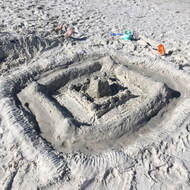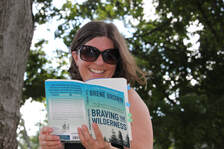|
7/12/2021 0 Comments Why beach time? For as long as I can remember, my family and I have been going to the beach at the beginning of June. When I was little, it was my parents, my sister, and I that went. Through middle and high school, my aunts, cousins, mom, and I travelled together. When I moved away for several years I couldn't join them, but once I came back to Kentucky, my parents and I started the annual tradition again. This post-COVID vaccine year, my husband and stepson joined us. While I love adventure and travelling new places, going to the same beach has become somewhat sacred to me--a ritual, if you will, and it's one that I look forward immensely. I read books, listen to the surf, wear a fancy sun hat, and visit our favorite restaurants. It's fun in the sun and sand (have you built a sand castle lately???), and a time to rest and smell the salty air. In sports we are always training towards that next goal or the next great feat, and we don't prioritize time off for recovery or family. Our competitive society teaches us that our worth is measured by our productivity, and our sports conditioning truly makes us believe it. We forget that we are enough as we are. We forget that the beauty of life is found in the small things. Because of this, when you leave sports, you may feel lazy or unproductive when you don't continue to achieve "great things". You may feel lost, looking for ways to build community, find purpose, and regain control of your life. One way to help regain control is to use rhythm and ritual to help ground yourself. Rituals have been a part of the human experience for thousands of years, and while modern society has drifted away from them, there's no doubt they can have a major impact on our lives. Paying attention to the rhythm of the seasons and celebrating and creating traditions with loved ones can bring new meaning to your life, especially when things feel otherwise chaotic. For me, sitting by the pool with my mom every June in St. Pete Beach is one of those rituals that always brings me back to my core.
0 Comments
 Some of you may have heard me mention this book a few moths ago, but it’s so good, that I have to bring it back into the conversation. In fact, it’s so good, that I have chosen it for the inaugural Skating Yogi Book Group. Here’s why: At the start of 2021, I decided to do some deep personal work and dive into some of my mental and emotional sticking points. As part of this, I took part in a 6-week immersive course by my friend, the amazing Dr. Katie Blake. This course was intended to guide participants through the process of deconstructing faith, offering support and community rather than dogma. It turns out that deconstructing faith is quite similar to dissecting the components of any culture or belief system, including those of competitive sports. This makes sense, since sports and religion have been intricately linked since ancient times in Native American, Eastern, and Western civilizations. While modern sports are a secular pursuit, many of the values and details of religion and sports are the same. Both deal with relationships to self and others, personal sacrifice, the pursuit of non-material achievements, and the promotion of purity and higher ideals. Additionally, both rely on ritual, rulebooks, holy houses, and heroes, and both can unite a group of people or tragically divide them. The first book we read in Dr. Katie Blake’s course was Brené Brown’s Braving the Wilderness. In this book Dr. Brown talks about our deep, biological need for community and how this need is becoming harder and harder to fulfill in today’s polarized society. Finding community has become even harder since the onset of the COVID-19 pandemic and the escalations of political tensions. Sports clubs and churches have traditionally offered us this belonging, but as society has become more fragmented, fewer people are staying in communities that we once were a part of. Leaving a restrictive community can be liberating, particularly for people who have traditionally been oppressed. Nevertheless, this freedom can also leave us quite alone. As Dr. Brown says, even as our need for community is greater than perhaps ever before, we are isolating ourselves more and more. We have lost our ability to find common ground, so we retreat. How do we fix it? According to Dr. Brown, the only way to fix our isolation is to learn to belong to no one but ourselves. You read that right—in order to find community with others, we must learn to belong primarily to ourselves. In Braving the Wilderness, Dr. Brown explains her theory of belonging from her 2010 book titled The Gifts of Imperfection, saying: Belonging is the innate human desire to be part of something larger than us. Because this yearning is so primal, we often try to acquire it by fitting in and by seeking approval, which are not only hollow substitutes for belonging, but often barriers to it. Because true belonging only happens when we present our authentic, imperfect selves to the world, our sense of belonging can never be greater than our level of self-acceptance. Wow. Read that last line again—“… our sense of belonging can never be greater than our level of self-acceptance.” We have all heard the sayings “you can’t help someone if they won’t help themselves” or “you can’t accept love until you love yourself”, and maybe we have even had experience with these realities. Either way, reading Dr. Brown’s theory of belonging helped things click for me in a completely new way. How often do we do or say things just to fit in? When you are having doubts about your sport or your desires to keep competing, or are growing apart from your friends and teammates, how long are you willing to hide your true desires from yourself and others? How much of yourself are you willing to sacrifice? Authenticity takes courage, but it’s the only true path to belonging. Dr. Brown goes on to say: True belonging is not something that you negotiate externally, it’s what you carry in your heart. It’s finding the sacredness in being a part of something and in braving the wilderness alone. When we reach this place, even momentarily, we belong everywhere and nowhere. I am here to tell you that you can find your place in sport and still be your authentic self. You can be part of a club or a team and not sacrifice your sense of self. As one of my students once said, “I realized that you can have friends and not be BFF’s with all of them”. If your current situation in sport does not allow you to be your true self, then I encourage you to explore why and to reach out for help to explore your options. Only when we belong to ourselves can we truly belong anywhere. This is my hope for you. Our first book club chat will be Sunday, Aug 15, 6:15-7:00 pm EDT. Register here (it's free) and join us! We will discuss Braving the Wilderness in more depth. To support local booksellers, you can purchase your book here. (This is an affiliate link, and I earn a small commission with each purchase). Are you looking for guidance on how to transition into a new place within or beyond your sport? Sign up for my mailing list to receive my 7 Principles for Life Beyond Sports to help you on your journey. |
Author // the skating yogiMy name is Sarah Neal. I have been immersed in the world of figure skating for over four decades. I have seen firsthand the abuse that happens at the higher levels of our sport and experienced how that trickles down into unhealthy training practices and habits at the grassroots. I have seen this play out in the operations of the very institutions that control our sport. Whether for a profession or hobby, pursuing skating should be a joyful, rewarding process, an opportunity for athletic and personal growth, and a place to build lasting friendships. Archives
March 2024
CategoriesAll Athlete Well Being Athlete Well-Being Deep Connections Embodied Movement And Meditation Practices Life After Competition Mindful Living |
Search by typing & pressing enter

 RSS Feed
RSS Feed